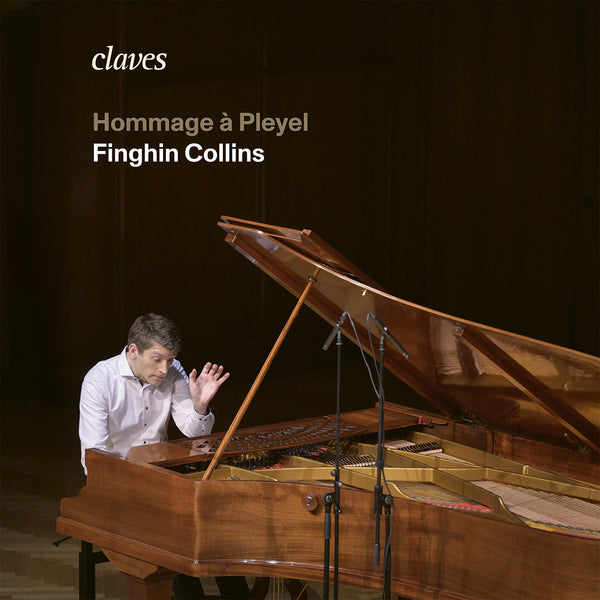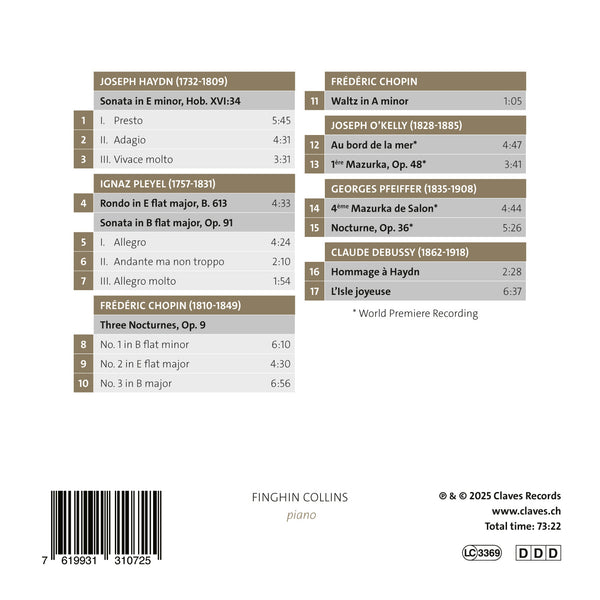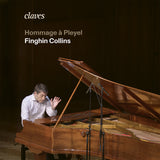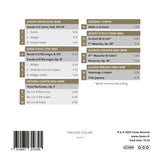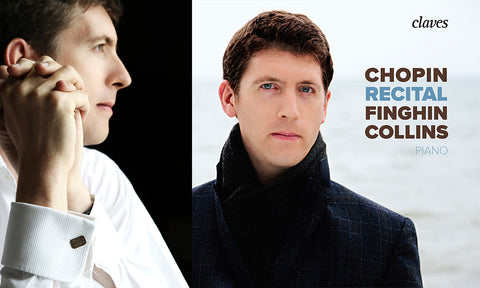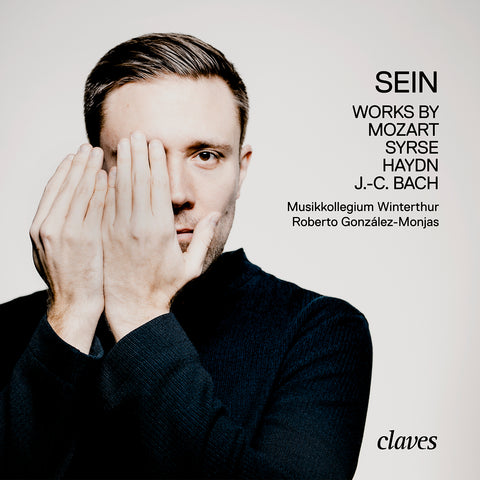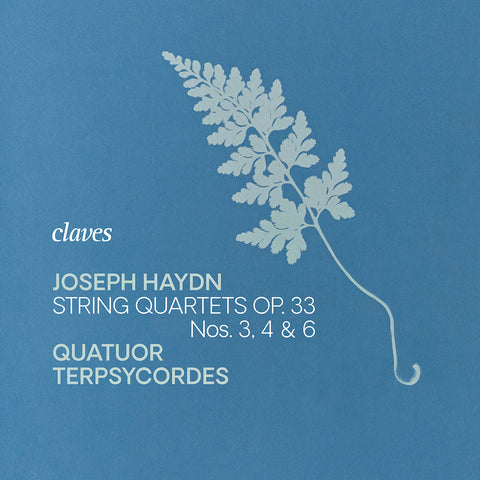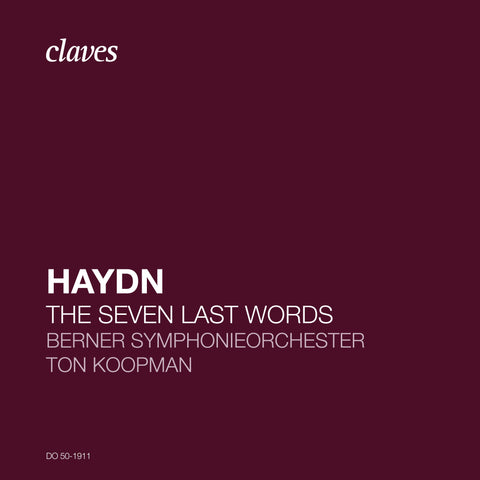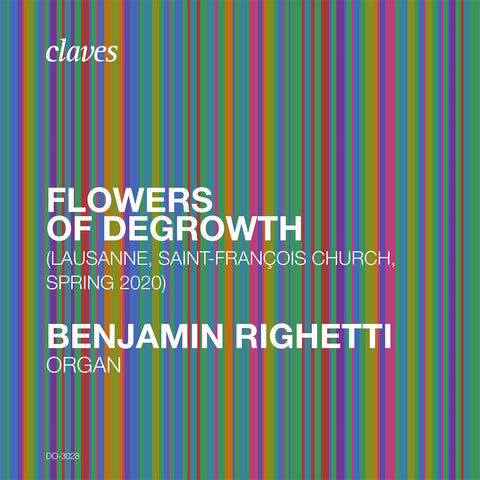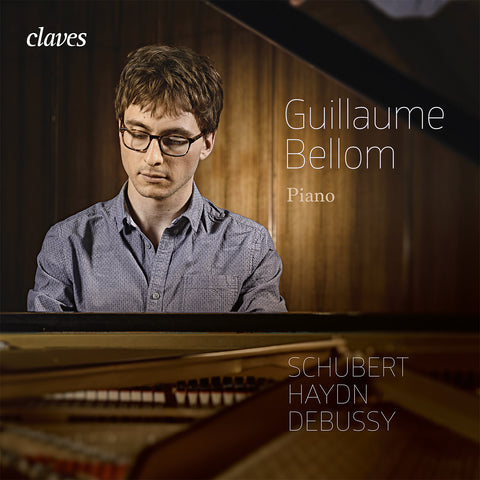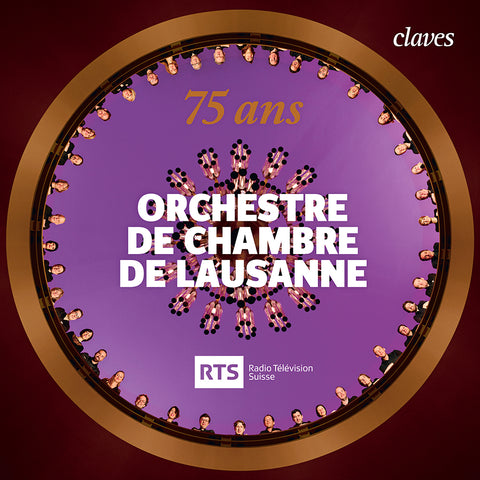(2025) Hommage à Pleyel
Category(ies): Piano Rarities
Instrument(s): Piano
Main Composer: Various composers (see collections)
CD set: 1
Catalog N°:
CD 3107
Release: 21.11.2025
EAN/UPC: 7619931310725
This album is now on repressing. Pre-order it at a special price now.
CHF 18.50
This album is no longer available on CD.
This album has not been released yet. Pre-order it from now.
CHF 18.50
This album is no longer available on CD.
CHF 18.50
VAT included for Switzerland & UE
Free shipping
This album is no longer available on CD.
VAT included for Switzerland & UE
Free shipping
This album is now on repressing. Pre-order it at a special price now.
CHF 18.50
This album is no longer available on CD.
This album has not been released yet.
Pre-order it at a special price now.
CHF 18.50
This album is no longer available on CD.
CHF 18.50
This album is no longer available on CD.
HOMMAGE À PLEYEL
Hommage à Pleyel - Finghin Collins
The origins of this project go back to 2022, when I was invited to perform on a rebuilt Pleyel 280 concert grand piano dating from 1937. The piano had been completely restored and rebuilt by Matthias Maurer of Piano Workshop, Puidoux, Switzerland and the concert was to take place in neighbouring Cully, as part of the festival Lavaux Classic 2023. The concept of the concert was to have two concert grand pianos on stage, a Steinway D and the Pleyel. I was to play a programme on both pianos, allowing the audience to compare the two instruments.
The experience was revelatory, particularly as I shared some movements across both instruments, allowing for a true comparison of the two pianos. The reaction from audience and press was unanimously positive. I had made a new friend, falling totally in love with the sound of the Pleyel piano and the ease with which one could draw beautiful sounds from it. I found it particularly beautiful in the slow movements of Haydn and Mozart sonatas, where the long notes seemed to linger longer than usual, but I also relished its singing, clear tone in Chopin and Schumann.
Almost immediately, I decided that I wanted to record a CD on this piano, with a programme celebrating the history of the Pleyel family and brand. The programme opens with one of my favourite sonatas by Joseph Haydn, the piano teacher of Ignaz Pleyel. I have been playing his E minor Sonata for years and I love the mix of humour and darkness, light and shade with its wickedly cheeky finale alternating between major and minor. This is followed by two lesser-known works by Ignaz Pleyel (1757–1831), who as well as being a pianist and composer was also a music publisher. In 1807 he founded the Pleyel piano manufacturing firm, which was to become very important in France during the nineteenth century. The influence of Haydn is clear in both the E flat Rondo and the short B flat Sonata; in particular the almost operatic, bubblingly energetic opening of the Sonata’s first movement and its witty and brief finale.
We now enter the world of Frédéric Chopin and Camille Pleyel, youngest son of Ignaz. Camille joined the firm in 1815 and became its owner when his father died in 1831. Pleyel supplied pianos to Chopin, who considered them the last word in perfection. The link between the friends was cemented by Chopin’s dedication of his three exquisite Nocturnes Op. 9, also composed in 1831, to Camille’s wife Marie Moke. Before we leave Chopin, we fast-forward to 2024 and the surprising discovery at the Morgan Library & Museum in New York City of a short waltz for piano by Chopin. When I was in New York last autumn, I was fortunate enough to meet Robinson McClellan, Associate Curator of Music Manuscripts at the Library. He had discovered the tiny manuscript among a file of letters and other documents. The waltz is a mere sketch and takes only about a minute to perform (with repeat!), but it is full of turmoil and well-suited to the darker registers of the Pleyel piano. I couldn’t resist including it in this programme.
We next hear works by two almost entirely forgotten composers – the Franco-Irish Joseph O’Kelly (1828– 1885) and the French Georges Pfeiffer (1835–1908). They were friends and both were partners in the Pleyel firm. In particular, I was fascinated to learn about O’Kelly, the eldest son of a Dublin-born piano teacher Joseph Kelly and his French wife Marie Duval. Although Joseph never became a French citizen and felt quite attached to his ancestral Ireland, he lived his entire life in France and apparently didn’t speak a word of English. The Kellys / O’Kellys went on to become an important musical dynasty in France in subsequent years, Joseph’s brilliant son Henri O’Kelly rubbing shoulders with the likes of Claude Debussy and Gabriel Pierné.
The four works on the CD, two by each composer, are light salon pieces which nowadays have been totally forgotten. They are full of charm and elegance and transport us back to the French salons of the mid-nineteenth century.
The CD finishes with two works by Claude Debussy, who also owned a Pleyel piano and whose music seems utterly suited to its sound palette. The first piece is the rarely-heard Hommage à Haydn, one of five pieces commissioned by the writer Jules Écorcheville in 1909 to mark the centenary of Haydn’s death. Each piece was based on a theme derived rather crudely from the letters of Haydn’s name: “B-A-D-D-G”. Debussy contributed a short mysterious waltz whose theme appears in several guises throughout.
The final piece of the recording is an altogether better-known work, the celebrated L’Isle joyeuse, dating from 1904, when Debussy had escaped to Jersey with the singer Emma Bardac, abandoning his wife Lilly in Paris. The composer said the work was inspired by Watteau’s 1717 painting L’Embarquement pour Cythère and indeed the piece evokes brilliantly the watery journey, the rising excitement and the eventual ecstatic arrival. The piece also wonderfully portrays the composer’s ecstasy at finding himself on his own Island of Joy with the object of his affection, who went on to become his second wife.
It has been a great joy to record this programme on such a very special piano and to invoke a sound world which is subtly different from the norm. It has also been a privilege to record the CD in the famous Salle de Musique in La Chaux-de-Fonds in Switzerland – a concert hall of which I had heard so much.
It is important to note that with this CD I am not seeking to recreate the sound of an old Pleyel piano from the 19th century. This piano is a modern twentieth-century instrument and very different from the earlier Pleyel pianos, many of which survive to this day and which have featured on many other recordings. The Pleyel 280 concert grand which we hear on this recording is a testament to the last great period of French piano manufacturing before the Second World War. This piano – numbered 977 out of a total of 999 – is one of the very last great concert grands which Pleyel built.
I would like to thank all of the organisations and individuals whose generosity, advice and support have helped make this project a reality. In particular I wish to thank Matthias Maurer for rescuing this instrument and nurturing it back to life.
Finghin Collins, June 2025
Finghin Collins, piano
“Of Finghin Collins as soloist, little needs to be said that has not been said before: he is exceptionally fluent, exceptionally intelligent, exceptionally sensitive, responding to every possible nuance that Stanford prescribes.”
Piers Burton-Page, International Record Review
One of Ireland’s most successful musicians, Finghin Collins was born in Dublin in 1977 and, following initial lessons with his sister Mary, studied piano at the Royal Irish Academy of Music with John O’Conor and at the Geneva Conservatoire with Dominique Merlet. Winner of multiple awards in his native Ireland, he went on to take first prize at the Clara Haskil Competition in Switzerland in 1999. Since then he has continued to enjoy a flourishing international career that takes him all over Europe and the United States, as well to the Far East and Australia.
Collins has performed with such orchestras as the Chicago Symphony Orchestra, Houston Symphony Orchestra, London Philharmonic Orchestra, Royal Philharmonic Orchestra, Rotterdam Philharmonic Orchestra, Budapest Festival Orchestra, Orchestra of the Eighteenth Century, Orchestre de la Suisse Romande, Gulbenkian Orchestra, Seoul Philharmonic Orchestra, BBC Symphony Orchestra, BBC Philharmonic Orchestra, Royal Liverpool Philharmonic Orchestra, Bournemouth Symphony Orchestra and the City of Birmingham Symphony Orchestra, garnering consistent praise from critics and public alike. Conductors with whom he has collaborated include Frans Brüggen, Myung-Whun Chung, Christoph Eschenbach, Hans Graf, Emmanuel Krivine, Nicholas McGegan, Gianandrea Noseda, Sakari Oramo, Tadaaki Otaka, Heinrich Schiff, Vassily Sinaisky, Leonard Slatkin and Gábor Tákacs-Nagy. He has also given solo recitals in many of the world’s most prestigious halls and participates frequently in chamber music festivals with a variety of colleagues of international standing.
In recent years Collins has performed at such festivals as the Verbier and Zermatt Festivals in Switzerland and Piano aux Jacobins and Nohant Festival Chopin in France. During the 2025/26 season Collins will return to the Wigmore Hall in London; his calendar also includes engagements in Korea, Switzerland, Mexico, Portugal, Ireland and Cyprus.
Over the past two decades Collins has developed a close relationship with Claves Records in Switzerland, recording two double CDs of Schumann’s piano music (which won numerous awards including Gramophone’s Editor’s Choice in 2006), followed by a recording of works for piano and orchestra by Charles V. Stanford with the RTÉ NSO / Kenneth Montgomery (Editor’s Choice, May 2011). In May 2013, Ireland’s classical radio station RTÉ lyric fm launched his recording of four Mozart piano concertos directed from the keyboard with the RTÉ National Symphony Orchestra. A Chopin recital CD was released in 2017, a co-production between RTÉ lyric fm and Claves Records, while in spring 2020 Claves released a recording of the Mozart Piano Quartets with Rosanne Philippens (violin), Máté Szücs (viola) and István Várdai (cello). This was followed in 2022 by a solo album The Bright Day is Done featuring diverse pieces inspired by the cyclical nature of night and day.
Finghin Collins makes a significant contribution to the musical landscape of his native Ireland, where he resides. Since 2013, he has been Artistic Director of Music for Galway. He is also the founding Artistic Director, since 2006, of the New Ross Piano Festival in Wexford as well as the Artistic Director, since 2023, of the Dublin International Piano Competition.
Collins is the Chairman of the jury of the Clara Haskil Competition in Switzerland in 2023 and 2025.
In 2017, the National University of Ireland conferred on him an honorary Degree of Doctor of Music.
REVIEWS
"Irish pianist Finghin Collins particularly appreciates the singing tone of the Pleyel piano, as he writes in the booklet accompanying his new album. He beautifully showcases this aspect of the instrument’s sound in his interpretations, performing pieces spanning more than a century, from works by Joseph Haydn to pieces by Claude Debussy. [..] At the Pleyel piano, Finghin Collins is a sensitive and attentive interpreter of moods, authentically and aptly translating them into sound with his skillful brushstrokes and atmospheric soundscapes reminiscent of watercolors." - Guy Engels, November 2025
"Il nous habitue aux pépites, Finghin Collins. Après un magnifique Récital Chopin ou un précédent disque thématique, The Bright Day is Done, le pianiste fait étinceler un Pleyel «moderne » de 1937, dont on dirait que les oeuvres ont été composées pour lui. Cet Hommage à Pleyel commence par la Sonate en mi mineur de Haydn, tout en finesses d’articulation, de rubato, de nuances émotionnelles. On est dans une ambiance intime, de salon. Ecrin dans lequel Finghin Collins love aussi les trois mélancoliques Nocturnes de l’op. 9 de Chopin, qui aimait précisément les pianos Pleyel. Les pièces de compositeurs moins connus, Ignaz Pleyel (un Rondo tout haydnien), voire oubliés, Joseph O’Kelly et Georges Pfeiffer, font partie des perles de ce disque qui va jusqu’à Debussy (et son Hommage à Haydn)." Elisabeth Haas, décembre 2025
"Was würden all die Violinschüler bloss spielen, gäbe es da nicht die prächtigen und leicht zu meisternden Werke von Ignaz Pleyel (1757–1831)! Der Komponist, Klavierfabrikant und Musikverlegerist allerdings in den Konzertsälen kaum zu hören. Umso schöner, widmet ihm der Pianist Finghin Collins nun eine Hommage. Diese Aufnahme ist eine klingende Schatztruhe." - Christian Berzins, Dezember 2025
"[..] The Irish pianist thus weaves a very personal album with a very particular instrument: crystalline without being overly resonant, capable of producing long notes without being strident or losing body. And regarding his performance, I'll be concise: fluidity, expressiveness, restraint, finesse, detail." - Pablo del Pozo, January 2026
"Finghin Collins gehört zu den wichtigsten Pianisten Irlands. Nicht nur als Musiker, sondern auch als Künstlerischer Leiter wichtiger Festivals hat er das Musikleben seiner Heimat nachhaltig geprägt. Seine internationale Karriere startete 1999 mit dem Sieg beim Concours international de piano Clara Haskil im schweizerischen Vevey. Bis heute ist er diesem alle zwei Jahre stattfindenden Wettbewerb verbunden; derzeit leitet er die Jury. Wir sprachen den Pianisten kurz vor dem Wettbewerbsfinale in seinem Hotel am Ufer des Genfersees." - ANTJE RÖSSLER, Januar 2026
Hommage à Pleyel - Finghin Collins
The origins of this project go back to 2022, when I was invited to perform on a rebuilt Pleyel 280 concert grand piano dating from 1937. The piano had been completely restored and rebuilt by Matthias Maurer of Piano Workshop, Puidoux, Switzerland and the concert was to take place in neighbouring Cully, as part of the festival Lavaux Classic 2023. The concept of the concert was to have two concert grand pianos on stage, a Steinway D and the Pleyel. I was to play a programme on both pianos, allowing the audience to compare the two instruments.
The experience was revelatory, particularly as I shared some movements across both instruments, allowing for a true comparison of the two pianos. The reaction from audience and press was unanimously positive. I had made a new friend, falling totally in love with the sound of the Pleyel piano and the ease with which one could draw beautiful sounds from it. I found it particularly beautiful in the slow movements of Haydn and Mozart sonatas, where the long notes seemed to linger longer than usual, but I also relished its singing, clear tone in Chopin and Schumann.
Almost immediately, I decided that I wanted to record a CD on this piano, with a programme celebrating the history of the Pleyel family and brand. The programme opens with one of my favourite sonatas by Joseph Haydn, the piano teacher of Ignaz Pleyel. I have been playing his E minor Sonata for years and I love the mix of humour and darkness, light and shade with its wickedly cheeky finale alternating between major and minor. This is followed by two lesser-known works by Ignaz Pleyel (1757–1831), who as well as being a pianist and composer was also a music publisher. In 1807 he founded the Pleyel piano manufacturing firm, which was to become very important in France during the nineteenth century. The influence of Haydn is clear in both the E flat Rondo and the short B flat Sonata; in particular the almost operatic, bubblingly energetic opening of the Sonata’s first movement and its witty and brief finale.
We now enter the world of Frédéric Chopin and Camille Pleyel, youngest son of Ignaz. Camille joined the firm in 1815 and became its owner when his father died in 1831. Pleyel supplied pianos to Chopin, who considered them the last word in perfection. The link between the friends was cemented by Chopin’s dedication of his three exquisite Nocturnes Op. 9, also composed in 1831, to Camille’s wife Marie Moke. Before we leave Chopin, we fast-forward to 2024 and the surprising discovery at the Morgan Library & Museum in New York City of a short waltz for piano by Chopin. When I was in New York last autumn, I was fortunate enough to meet Robinson McClellan, Associate Curator of Music Manuscripts at the Library. He had discovered the tiny manuscript among a file of letters and other documents. The waltz is a mere sketch and takes only about a minute to perform (with repeat!), but it is full of turmoil and well-suited to the darker registers of the Pleyel piano. I couldn’t resist including it in this programme.
We next hear works by two almost entirely forgotten composers – the Franco-Irish Joseph O’Kelly (1828– 1885) and the French Georges Pfeiffer (1835–1908). They were friends and both were partners in the Pleyel firm. In particular, I was fascinated to learn about O’Kelly, the eldest son of a Dublin-born piano teacher Joseph Kelly and his French wife Marie Duval. Although Joseph never became a French citizen and felt quite attached to his ancestral Ireland, he lived his entire life in France and apparently didn’t speak a word of English. The Kellys / O’Kellys went on to become an important musical dynasty in France in subsequent years, Joseph’s brilliant son Henri O’Kelly rubbing shoulders with the likes of Claude Debussy and Gabriel Pierné.
The four works on the CD, two by each composer, are light salon pieces which nowadays have been totally forgotten. They are full of charm and elegance and transport us back to the French salons of the mid-nineteenth century.
The CD finishes with two works by Claude Debussy, who also owned a Pleyel piano and whose music seems utterly suited to its sound palette. The first piece is the rarely-heard Hommage à Haydn, one of five pieces commissioned by the writer Jules Écorcheville in 1909 to mark the centenary of Haydn’s death. Each piece was based on a theme derived rather crudely from the letters of Haydn’s name: “B-A-D-D-G”. Debussy contributed a short mysterious waltz whose theme appears in several guises throughout.
The final piece of the recording is an altogether better-known work, the celebrated L’Isle joyeuse, dating from 1904, when Debussy had escaped to Jersey with the singer Emma Bardac, abandoning his wife Lilly in Paris. The composer said the work was inspired by Watteau’s 1717 painting L’Embarquement pour Cythère and indeed the piece evokes brilliantly the watery journey, the rising excitement and the eventual ecstatic arrival. The piece also wonderfully portrays the composer’s ecstasy at finding himself on his own Island of Joy with the object of his affection, who went on to become his second wife.
It has been a great joy to record this programme on such a very special piano and to invoke a sound world which is subtly different from the norm. It has also been a privilege to record the CD in the famous Salle de Musique in La Chaux-de-Fonds in Switzerland – a concert hall of which I had heard so much.
It is important to note that with this CD I am not seeking to recreate the sound of an old Pleyel piano from the 19th century. This piano is a modern twentieth-century instrument and very different from the earlier Pleyel pianos, many of which survive to this day and which have featured on many other recordings. The Pleyel 280 concert grand which we hear on this recording is a testament to the last great period of French piano manufacturing before the Second World War. This piano – numbered 977 out of a total of 999 – is one of the very last great concert grands which Pleyel built.
I would like to thank all of the organisations and individuals whose generosity, advice and support have helped make this project a reality. In particular I wish to thank Matthias Maurer for rescuing this instrument and nurturing it back to life.
Finghin Collins, June 2025
Finghin Collins, piano
“Of Finghin Collins as soloist, little needs to be said that has not been said before: he is exceptionally fluent, exceptionally intelligent, exceptionally sensitive, responding to every possible nuance that Stanford prescribes.”
Piers Burton-Page, International Record Review
One of Ireland’s most successful musicians, Finghin Collins was born in Dublin in 1977 and, following initial lessons with his sister Mary, studied piano at the Royal Irish Academy of Music with John O’Conor and at the Geneva Conservatoire with Dominique Merlet. Winner of multiple awards in his native Ireland, he went on to take first prize at the Clara Haskil Competition in Switzerland in 1999. Since then he has continued to enjoy a flourishing international career that takes him all over Europe and the United States, as well to the Far East and Australia.
Collins has performed with such orchestras as the Chicago Symphony Orchestra, Houston Symphony Orchestra, London Philharmonic Orchestra, Royal Philharmonic Orchestra, Rotterdam Philharmonic Orchestra, Budapest Festival Orchestra, Orchestra of the Eighteenth Century, Orchestre de la Suisse Romande, Gulbenkian Orchestra, Seoul Philharmonic Orchestra, BBC Symphony Orchestra, BBC Philharmonic Orchestra, Royal Liverpool Philharmonic Orchestra, Bournemouth Symphony Orchestra and the City of Birmingham Symphony Orchestra, garnering consistent praise from critics and public alike. Conductors with whom he has collaborated include Frans Brüggen, Myung-Whun Chung, Christoph Eschenbach, Hans Graf, Emmanuel Krivine, Nicholas McGegan, Gianandrea Noseda, Sakari Oramo, Tadaaki Otaka, Heinrich Schiff, Vassily Sinaisky, Leonard Slatkin and Gábor Tákacs-Nagy. He has also given solo recitals in many of the world’s most prestigious halls and participates frequently in chamber music festivals with a variety of colleagues of international standing.
In recent years Collins has performed at such festivals as the Verbier and Zermatt Festivals in Switzerland and Piano aux Jacobins and Nohant Festival Chopin in France. During the 2025/26 season Collins will return to the Wigmore Hall in London; his calendar also includes engagements in Korea, Switzerland, Mexico, Portugal, Ireland and Cyprus.
Over the past two decades Collins has developed a close relationship with Claves Records in Switzerland, recording two double CDs of Schumann’s piano music (which won numerous awards including Gramophone’s Editor’s Choice in 2006), followed by a recording of works for piano and orchestra by Charles V. Stanford with the RTÉ NSO / Kenneth Montgomery (Editor’s Choice, May 2011). In May 2013, Ireland’s classical radio station RTÉ lyric fm launched his recording of four Mozart piano concertos directed from the keyboard with the RTÉ National Symphony Orchestra. A Chopin recital CD was released in 2017, a co-production between RTÉ lyric fm and Claves Records, while in spring 2020 Claves released a recording of the Mozart Piano Quartets with Rosanne Philippens (violin), Máté Szücs (viola) and István Várdai (cello). This was followed in 2022 by a solo album The Bright Day is Done featuring diverse pieces inspired by the cyclical nature of night and day.
Finghin Collins makes a significant contribution to the musical landscape of his native Ireland, where he resides. Since 2013, he has been Artistic Director of Music for Galway. He is also the founding Artistic Director, since 2006, of the New Ross Piano Festival in Wexford as well as the Artistic Director, since 2023, of the Dublin International Piano Competition.
Collins is the Chairman of the jury of the Clara Haskil Competition in Switzerland in 2023 and 2025.
In 2017, the National University of Ireland conferred on him an honorary Degree of Doctor of Music.
REVIEWS
"Irish pianist Finghin Collins particularly appreciates the singing tone of the Pleyel piano, as he writes in the booklet accompanying his new album. He beautifully showcases this aspect of the instrument’s sound in his interpretations, performing pieces spanning more than a century, from works by Joseph Haydn to pieces by Claude Debussy. [..] At the Pleyel piano, Finghin Collins is a sensitive and attentive interpreter of moods, authentically and aptly translating them into sound with his skillful brushstrokes and atmospheric soundscapes reminiscent of watercolors." - Guy Engels, November 2025
"Il nous habitue aux pépites, Finghin Collins. Après un magnifique Récital Chopin ou un précédent disque thématique, The Bright Day is Done, le pianiste fait étinceler un Pleyel «moderne » de 1937, dont on dirait que les oeuvres ont été composées pour lui. Cet Hommage à Pleyel commence par la Sonate en mi mineur de Haydn, tout en finesses d’articulation, de rubato, de nuances émotionnelles. On est dans une ambiance intime, de salon. Ecrin dans lequel Finghin Collins love aussi les trois mélancoliques Nocturnes de l’op. 9 de Chopin, qui aimait précisément les pianos Pleyel. Les pièces de compositeurs moins connus, Ignaz Pleyel (un Rondo tout haydnien), voire oubliés, Joseph O’Kelly et Georges Pfeiffer, font partie des perles de ce disque qui va jusqu’à Debussy (et son Hommage à Haydn)." Elisabeth Haas, décembre 2025
"Was würden all die Violinschüler bloss spielen, gäbe es da nicht die prächtigen und leicht zu meisternden Werke von Ignaz Pleyel (1757–1831)! Der Komponist, Klavierfabrikant und Musikverlegerist allerdings in den Konzertsälen kaum zu hören. Umso schöner, widmet ihm der Pianist Finghin Collins nun eine Hommage. Diese Aufnahme ist eine klingende Schatztruhe." - Christian Berzins, Dezember 2025
"[..] The Irish pianist thus weaves a very personal album with a very particular instrument: crystalline without being overly resonant, capable of producing long notes without being strident or losing body. And regarding his performance, I'll be concise: fluidity, expressiveness, restraint, finesse, detail." - Pablo del Pozo, January 2026
"Finghin Collins gehört zu den wichtigsten Pianisten Irlands. Nicht nur als Musiker, sondern auch als Künstlerischer Leiter wichtiger Festivals hat er das Musikleben seiner Heimat nachhaltig geprägt. Seine internationale Karriere startete 1999 mit dem Sieg beim Concours international de piano Clara Haskil im schweizerischen Vevey. Bis heute ist er diesem alle zwei Jahre stattfindenden Wettbewerb verbunden; derzeit leitet er die Jury. Wir sprachen den Pianisten kurz vor dem Wettbewerbsfinale in seinem Hotel am Ufer des Genfersees." - ANTJE RÖSSLER, Januar 2026
Return to the album | Read the booklet | Open online links | Composer(s): Various Composers | Main Artist: Finghin Collins




STUDIO MASTER (HIGH-RESOLUTION AUDIO)
Claude Debussy (1862-1918)
Finghin Collins - piano
Frédéric Chopin (1810-1849)
Georges Pfeiffer (1835-1908)
High-resolution audio - Studio master quality
Ignaz Pleyel (1757-1831)
In stock
Joseph Haydn (1732-1809)
Joseph O’Kelly (1828 – 1885)
New releases
Piano
Rarities
Various composers
World Premiere Recording
Claude Debussy (1862-1918)
Finghin Collins - piano
Frédéric Chopin (1810-1849)
Georges Pfeiffer (1835-1908)
High-resolution audio - Studio master quality
Ignaz Pleyel (1757-1831)
In stock
Joseph Haydn (1732-1809)
Joseph O’Kelly (1828 – 1885)
New releases
Piano
Rarities
Various composers
World Premiere Recording








